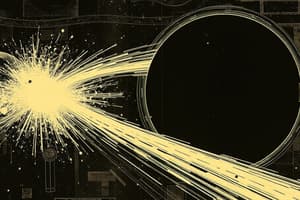Podcast
Questions and Answers
What is the primary cause for the formation of black holes?
What is the primary cause for the formation of black holes?
- The gravitational collapse of massive stars (correct)
- The merging of two neutron stars
- The explosion of supernovae
- The collision of galaxies
What is the outer boundary of a black hole called?
What is the outer boundary of a black hole called?
- Event horizon
- Gravitational lensing
- Singularity
- Schwarzschild radius (correct)
What are singularities associated with black holes?
What are singularities associated with black holes?
- Regions of infinite density and curvature of spacetime
- Areas where the laws of physics break down
- Hypothetical points of zero volume and infinite mass
- All of the above (correct)
Which of the following statements about black holes is true?
Which of the following statements about black holes is true?
What is contained at the center of a black hole?
What is contained at the center of a black hole?
How do black holes influence our understanding of the universe?
How do black holes influence our understanding of the universe?
Which of the following is NOT mentioned as a way black holes influence our understanding of the universe?
Which of the following is NOT mentioned as a way black holes influence our understanding of the universe?
How can scientists detect black holes?
How can scientists detect black holes?
What is a unique property of black holes?
What is a unique property of black holes?
What do black holes represent?
What do black holes represent?
What is the primary reason mentioned for our continued learning about black holes?
What is the primary reason mentioned for our continued learning about black holes?
Study Notes
Black Holes
Black holes represent one of the most extreme phenomena in our universe. These celestial objects result from the gravitational collapse of massive stars, where their own gravity causes such intense density that nothing can escape, not even light. In this article, we will explore the fundamental properties and characteristics of black holes, along with their impact on the cosmos.
Formation
Black holes are born when massive stars reach the end of their lives and collapse under the force of gravity. The star compresses into an infinitely small point known as a singularity, forming a black hole. The outer boundary of this event horizon is called the Schwarzschild radius.
Properties and Characteristics
Black holes have several unique properties. They are incredibly dense, with a teaspoonful of a black hole containing more mass than all the matter between Earth and the Sun. Despite their immense density, black holes also possess extremely strong gravitational fields that can severely warp space-time around them. This property allows scientists to detect black holes indirectly by observing the effects they have on nearby objects, such as stars and gas clouds.
Singularities
At the center of every black hole lies a singularity, where the laws of physics break down due to infinite density, pressure, and temperature. Although these conditions are impossible to observe directly, theoretical models predict that singularities would exist around black holes if they were not hidden behind their event horizons.
Impact on the Cosmos
The presence of black holes significantly influences our understanding of the universe. Their intense gravitational forces can affect the orbits of celestial bodies, including planets and galaxies. Additionally, the energy released from accretion discs surrounding some black holes has provided key insights into the nature of dark matter. Moreover, black holes act as 'cosmic laboratories', providing scientists with valuable data about extreme gravity and high-energy processes within the universe.
In conclusion, black holes represent fascinating objects that challenge our understanding of reality. With ongoing research and technological advancements, we continue to learn more about these enigmatic entities and their role in shaping the cosmos.
Studying That Suits You
Use AI to generate personalized quizzes and flashcards to suit your learning preferences.
Description
Explore the formation, properties, and impact of black holes in the universe. Learn about their intense density, strong gravitational fields, singularities, and influence on celestial bodies and high-energy processes.





